#child support lawyers in Philadelphia
Explore tagged Tumblr posts
Text
Parenting Coordination with the Help of Child Support Lawyers in Philadelphia
Navigating the complexities of co-parenting after a divorce or separation can be challenging, mainly when disagreements and conflicts arise. In Philadelphia, parenting coordination and the assistance of child support lawyers play a crucial role in managing these challenges and ensuring the child's best interests are upheld. This article explores the importance of parenting coordination and how child support lawyers in Philadelphia can provide essential support to needy families.

Understanding Parenting Coordination
What is Parenting Coordination?
Parenting coordination is a child-focused dispute resolution designed to assist parents in implementing and complying with their parenting plans. A parenting coordinator (PC) is a neutral third-party professional, often with a background in law, psychology, or social work, who works with high-conflict parents to resolve ongoing disputes related to their children. Parenting coordination aims to reduce parental conflict, improve communication, and create a more stable and predictable environment for the child.
The Role of Child Support Lawyers in Parenting Coordination
Legal Guidance and Representation
Child support lawyers in Philadelphia play a critical role in supporting families through the parenting coordination process. Their expertise in family law ensures that parents receive the legal representation and guidance they need to navigate complex custody and support issues.
Drafting and Modifying Parenting Plans
Child support lawyers assist in drafting and modifying parenting plans that are fair, comprehensive, and in the child's best interests. They ensure the plans are legally binding and enforceable, providing a clear framework for co-parenting.
Advocating for the Child's Best Interests
Child support lawyers advocate for the child's best interests in all legal proceedings. They work to ensure that the child's needs are prioritized and that any decisions made are in the child's favor. This includes advocating for appropriate child support arrangements that meet the child's financial needs.
Mediating Conflicts
Child support lawyers often act as mediators between parents, helping to resolve conflicts amicably and without the need for contentious court battles. Their legal expertise and understanding of family dynamics enable them to facilitate productive discussions and find mutually agreeable solutions.
Benefits of Parenting Coordination and Legal Support
Reducing Parental Conflict
One of the main benefits of parenting coordination and legal support is reducing parental conflict. High levels of conflict between parents can have a detrimental impact on children, leading to emotional and behavioral issues. By providing a well-structured process for resolving disputes, parenting coordination helps to minimize conflict and create a more harmonious co-parenting relationship.
Improving Stability for Children
Parenting coordination and the involvement of child support lawyers contribute to creating a stable and predictable environment for children. Consistency in parenting time, clear communication, and adherence to parenting plans give children a sense of security and routine.
Ensuring Fair Financial Support
Child support lawyers ensure that children receive fair and adequate financial support. They work to establish child support arrangements that reflect the child's needs and the parent's economic capabilities, ensuring that the child's well-being is not compromised.
Empowering Parents
Parenting coordination in Pennsylvania empowers parents by providing them with the tools and strategies to co-parent effectively. Through education, mediation, and legal support, parents can develop better communication skills, constructively manage conflicts, and work together in their child's best interests.
Parenting coordination, with the support of child support lawyers, offers a valuable resource for families navigating the challenges of co-parenting after a separation or divorce. By facilitating communication, resolving disputes, and ensuring compliance with parenting plans, parenting coordinators help create a more stable and supportive environment for children. Child support lawyers provide legal guidance and advocacy to protect the child's best interests and ensure fair financial support. Together, these professionals play a crucial role in helping families transition to a new co-parenting dynamic that prioritizes the child's well-being.
#child support lawyers in Philadelphia#child support lawyers#child support#Philadelphia child support lawyers#attorney#family law
0 notes
Text

Child support matters can be overwhelming, but you don't have to face them alone! For expert advice, contact the skilled Child Support Lawyer at Velter Yurovsky Zoftis Sokolson, LLC, in Northeast Philadelphia.
2 notes
·
View notes
Text
A 27-year-old teacher's aide at a New Jersey high school has been charged with first-degree aggravated sexual assault and endangering the welfare of a child after it was discovered that she had a two-year sexual relationship with a student.
Michelle Jacoby, who also worked as the Riverside High School marching band director, was detained on Tuesday night and released the following day after an appearance in court.
On Tuesday, the district attorney's office received a tip-off that a male freshman had revealed to another teacher that he had been involved in a sexual relationship with Jacoby.
An investigation revealed that the relationship continued for two years and involved several encounters at Jacoby's house. Authorities are withholding the student's age and other information to protect their identity.
The Burlington County Prosecutor's Office revealed the charges against her on Wednesday.
"The safety of our students and staff is absolutely paramount," stated Riverside Superintendent Michael Adams, who also revealed that Jacoby has been suspended.
"Therefore, I want to assure you that based on the information shared with me regarding this specific allegation from a few years ago, there is no current safety concern for our staff or students.”
He assured me that the school district will continue to cooperate with the authorities regarding the case and provide the necessary support for staff and students where needed.
Jacoby was released pending a court hearing. No lawyer was noted for Jacoby in court files.
Jacoby’s case is one of many teacher-student abuse cases noted in New Jersey over the last four years as local lawmakers crack down on sexual predators in learning institutions, per NBC Philadelphia.
These sexual predators have come in all shapes and sizes, both male and female, and of all ages, and some most times turned out to be the most unsuspecting characters.
28 notes
·
View notes
Text

When dealing with sensitive family legal matters, it's crucial to have the guidance of a skilled Philadelphia Family Attorney. These professionals offer compassionate support and expert advice to navigate complex issues such as divorce, child custody, and adoption. A dedicated Philadelphia Family Attorney can provide personalized solutions tailored to each client's unique needs.
0 notes
Text
Philadelphia Child Custody Lawyer
The following are some issues you should be conscious of both before and during the authorized course of, based on a September eleven,... This ruling represents a watershed moment for all aspects of... If you are wanting to get divorced, you probably can file for divorce right away , however there are required ready intervals.
We want to have the type of relationship with you that you just come to us first whenever you want one thing one or ten years from now. Leading the agency is Mobile, Alabama native, Alison Baxter Herlihy who has practiced law since 2005. Alison has gained many awards and been recognized for her legal talents and professional requirements. Also representing the agency is attorney Walter Gewin, a native Mobilian.
I'm a retired Marine and would extremely advocate them to all my fellow energetic responsibility and veteran family. Also anyone that wants a law agency that has integrity is decisive and actually cares about your case and finds one of the best ways to handle your wants.They had been all the time... Choosing an excellent family law attorney is amongst the most essential selections you might make. I was referred to Farzad & Ochoa Law Firm by a family member. His attention to element was impressive in comparison with other lawyers I truly have had up to now. Attorneys, if they are skilled family law litigators, ought to know the elements that significantly lower or enhance the price of the divorce.
First, you and your spouse should stay separate and aside for no much less than one year. During this time, a minimum of considered one of you must intend for this separation to be everlasting. Second, one partner will have to have incurable insanity and both of you have to reside separate and part for 3 years. Our experienced Utah attorneys have the compassion to work with you and the skills child custody lawyer to carry out the authorized solution you need. Life changes could necessitate adjusting your custody arrangement. Utah custody rules enable any parent to make a custody adjustment request if the child or parents’ circumstances have modified materially or if it has been greater than three years since the prior custody order was entered.
The evaluator is a highly skilled professional in custody issues. He will meet with the children and fogeys and observe them together and then make a determination and report to the choose his findings. In addition to financial points, the custody arrangement is often one of the extremely contested parts of any divorce motion family law attorney child custody near me that includes youngsters. When it involves determining how custody ought to be arranged the courts look to what could be the "greatest interests" of the child. That implies that the choose, in his sole discretion, determines who should get the kids, for a way long, and when.
Both dad and mom have a proper to frequent contact with their youngsters. Even if a father or mother has suffered from drug dependancy or bodily violence, a court docket could grant supervised visitation. Her dad and child custody lawyers near me mom – the children’s grandparents – sought bodily custody of the children to make sure they obtained good meals, stayed safe, and prevented dangers attributable to Dora’s mental sickness and impulsiveness.
She has a quantity of years of expertise handling legal instances and family law circumstances, together with divorce, child custody, child support, and adoption instances. In a divorce case, both parents will usually proceed to share custody, now often recognized as parenting time and parental duties, unless one of them poses a danger to the youngsters. When a baby child custody attorney is born to single mother and father, the daddy might want to set up authorized paternity to safe parental rights and petition for the allocation of parental responsibilities. I deal with legal issues involving your family, from prenuptial agreements to divorce and parenting time actions. When the most important issues to you're on the road, you want an attorney who will struggle for what's important.
We provide a 15% discount to navy personnel and their spouses, in addition to hospital healthcare employees. Your family law attorney will prepare a free preliminary consultation to debate your legal issues in detail. Firm leader Jane Wesley Brooks believes focus produces better outcomes.
An attorney must gather and prepare proof, create and refine questions for all events concerned and prepare for what the other attorney or celebration goes to present. The attorney listing will let a father or mother know if an attorney is in good standing with the state bar or if their attorney's license has been suspended and if that's the case, the reasons for suspension status. Most states require attorneys to disclose that information child custody lawyers to a prospective consumer. Additionally, an attorney can not apply law in states the place their license has been suspended. Physical custody refers again to the period of time each mother or father is permitted physically with a toddler. Supreme Court issued a monumental determination on identical intercourse marriage that may have an result on each state within the union.
0 notes
Photo

Family Law Attorney in Pennsylvania
#philadelphia#lawyer#divorce lawyer#family law#child support#child custody#divorce attorney#pennsylvania#buckscountypa#family#legalhelp
1 note
·
View note
Text

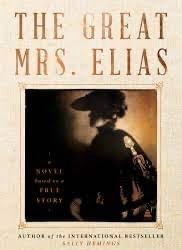
Hannah Elias was one of the richest African women who ever lived, but because she was a sex worker who ultimately became the largest Black landlord in New York, she is largely unknown to Us...
Hannah Elias was born in Philadelphia, Pennsylvania, sometimes during 1865 at 1820 Addison Street, one of nine children. Her father Charles Elias was a "negro with Indian blood in him" who ran a large, well-regarded catering operation, her mother Mary Elias was "almost white", and they sent her to public school. In 1884, to attend her sister Hattie's wedding in style, Hannah borrowed a ball gown without permission from her employer, leading to a sentence at Moyamensing Prison and her banishment from home.
On her own
Supporting herself as a sex worker at a "resort" owned by Emelyn Truitt in Manhattan's Tenderloin neighborhood, she met wealthy glass-factory owner John R. Platt, forty-five years her senior. She left the brothel when her twin brother David and suitor Frank P. Satterfield asked her to live with the latter in a boardinghouse in east Philadelphia. She became pregnant and gave birth at the Blockley Almshouse in December 1885, giving the child up for adoption.
Affair with John R. Platt
After Elias reunited with Platt, he gave her large sums of money, "volunteerd [sic] to start her in the boarding-house business", at 128 W 53rd Street, where as proprietress she rented a room to Cornelius Williams. She then moved into a mansion at 236 Central Park West, passing as Sicilian or Cuban. Williams later fatally shot city planner Andrew H. Green in front of Green's Park Avenue home, confusing him with Platt.
Blackmail case
When Platt, prodded by his family, accused her of blackmailing him out of $685,385, the affair merited The World's lead story on 1 June 1904, describing her as his "ebony enslaver". Asked about allegations that she had been blackmailed as well, she responded "I have read in the newspapers that I have been, and I am frank to say that there must be some truth in a story which is given so much in detail." The novelty of a Black woman with the equivalent of tens of millions of dollars, living in one of the wealthiest neighborhoods in New York, caused the Seeing New York electric bus tours to make Elias's house a stop. Platt initially refused to swear a criminal complaint, but relented, allowing police serving a criminal warrant to break down her door, where they were escorted to Elias by her Japanese butler, Kato. At the time she said: "I have no fear. I have done no wrong, and every one of the poor people I have helped is praying for me in the time of my affliction." She was arraigned in Tombs Court on June 10, 1904.
Held on $30,000 bail, meetings at the house of R. C. Cooper at 318 W. 58th St. and 149 W. 43rd St. raised money for her release. When Platt was "asked directly about Hannah Elias he aimed blows at the reporter with his umbrella and shouted: 'Don't talk to me about Hannah Elias.'" The story spread, leading to detailed court coverage in the Baltimore Sun as she took the stand and described how her money was kept in "15 savings banks" as well as "houses and lands worth $150,000, furniture and plate, worth $100,000, and jewels valued at as much more." After losing his initial court case, the court of appeals eventually ruled against Platt, allowing her to keep his gifts.
Later life
In 1906, newspapers reported that Elias evicted white tenants from several apartment buildings on West 135th Street with a note reading, "in the future none but respectable colored families were to occupy the flats". She was rumored to have continued in this vein, named in a 1912 article titled "Negroes Crowding Whites" as the purchaser of a $250,000 apartment building at 546–552 Lenox Avenue; however, she refuted these claims through her lawyer, Andrew F. Murray, in 1906. By 1915 she was living in a penthouse in one of her "numerous properties" at 501 W. 113th St. She joined forces with noted Harlem developer John Nail but later left for Europe with her butler, Kato, never to return.
Her death date is unknown.
27 notes
·
View notes
Photo

“Plutocracy is a word that means rule by and for the rich. The United States is a country run by and for the rich. Therefore, it is a plutocracy...
“Documents like the Constitution, which I, as a child, had been taught to regard as almost divine in their origin, stood before me for what they were – plans prepared by business men to stabilize business interests… “Their goal was the protection of the propertied interests and they drew the Constitution with that end in view … This point is so fundamental to a proper understanding of what I have to say about the machinery of American Government that I desire to emphasize it...
“School teachers talk to children and public men harangue their constituents as though the Constitution were a document drawn to establish human liberty. By these means our ideas as to the intention of the framers of the Constitution have been utterly distorted. Anyone who wishes to know the facts should examine the Journal of the Constitutional Convention…
“The Constitution was not drawn up to safeguard liberty. Its framers had property rights in their minds’ eye and property deeds in their pockets, and its most enthusiastic supporters were the leading bankers, manufacturers and traders of the Federated States. The Constitution was made to protect the rights of property and not the rights of man. These facts are neither secret nor hidden …
“The convention that framed the Constitution of the United States convened at Philadelphia in 1787 behind closed doors. All of the delegates were sworn to secrecy. Madison reported the proceedings of the convention in longhand and his notes were purchased in 1837 by Congress and published by the Government nearly half a century after the convention had finished its work …
“All through the debates ran one theme: How to secure a government, not by the people and for the people, but by the classes and for the classes, with the lawyers in control...
“There were fifty-five delegates present in the Convention. A majority were lawyers; most of them came from towns; there was not one farmer, mechanic or laborer among them; five-sixths had property interests … 15 were slave-holders. Washington, the big man of the Convention was a slaveholder, land speculator …
“The Constitution, as framed by the Convention, says nothing about the rights of man. It contains no guarantee of free speech, of free press, of free assemblage, or of religious liberty. It breathes no single hint of freedom.”
- Senator R.F. Pettigrew, 1922
19 notes
·
View notes
Text
When Should you Hire a Local Child Support Attorney?
If you are involved in an ongoing custody dispute and cannot agree with your ex-spouse, then it may be time to hire an attorney. Your child will be the biggest beneficiary of your decision to hire a lawyer. The court can help you decide how much child support each parent should pay based on their income level, work schedule, and other factors. An attorney can also help you get temporary custody until the court can decide.

Situations to Hire a Local Child Support Attorney
If you have a current court order for child support, but your ex-spouse or former partner isn't paying on time or at all, you should consult with an attorney about enforcing that order.
If you need advice on whether or not you should pursue child support payments from someone who isn't currently married to you, an attorney may be able to advise you on whether or not it would be worth doing so—even if there isn't an existing court order in place.
If you have been ordered by the court to pay child support but aren't sure how much money you should be spending each month, an attorney can help calculate this amount based on factors such as income, expenses, number of children involved, etc.
You also need legal help if there's been a change in circumstances that impacts how much money you pay or get each month. For example, if one parent has lost their job, they might need additional assistance paying for daycare or other expenses. An attorney can help determine whether those changes justify modifying child support payments so that both parents receive what they need without breaking the bank on either end!
Children are entitled to receive financial support from their parents in many cases. It can be money for college tuition or other expenses like medical bills. If you have questions about child support in Pennsylvania, then it may be time to contact experienced child support lawyers in Philadelphia, like Vetrano | Vetrano & Feinman.
#child support lawyers in Philadelphia#child support lawyers#Philadelphia child support lawyers#Local Child Support Attorney
0 notes
Text
The Ikelers: A Family Chronicle, 1753-2018 (Part III)
The Ikelers in the Nineteenth Century There are many descendants of Wilhelm who, to this day, live within a few miles of Jerseytown and his original Greenwood farm. They are, most of them, eight or nine generations removed either from his eldest son, Andrew, or his only daughter, Elizabeth. (Barnabus, his second son, did not marry, and William, his third born, though he married in New Jersey and lived out his life in Columbia County, could not convince most of his descendants to stay. Many migrated west to Ohio and beyond.) Especially if you can trace your ancestry back to Andrew Ikeler, you will easily find third, fourth and fifth cousins in Bloomsburg and neighboring townships. Evidence of their long presence and influence is everywhere in Columbia County—in two Ikeler cemeteries, a church, a street, and even a village named Ikelertown. In the case of Wilhelm’s friend Daniel, and his son-in-law William, Elizabeth’s legacy lives on in the ubiquity of the Welliver name in local phone directories, in the Jerseytown cemetery established by Daniel, and in numerous published histories of Daniel’s involvement with the ill-fated Whitmayers. There is, in fact, near Bloomsburg a country crossroads and a hamlet surrounding it named “Welliverville.” Those two families, after all, were among the first pioneer farmers to clear and work the land after the 1780 treaty with the local native-Americans. Ikelers and Wellivers have been there ever since. In this segment of the narrative, I’ll be looking at three generations of Ikelers who lived all or most of their lives in nineteenth-century Columbia County, PA. They are, in order, Andrew Ikeler (1772-1850) and his wife Christiana, nee Johnson (1774-1865); Andrew’s son Isaac (1804-1883) and his wife Mary, nee Taylor (1810-1872); and Isaac’s son Elijah (1838-1898) and his wife Helena, nee Armstrong (1840-1913). For information about the siblings of Isaac or Elijah (there were in fact a dozen), the best local sources are the County Courthouse and the Columbia County Historical and Genealogical Society in Bloomsburg. Under discussion here are only the children from whom my immediate family and I are descended. Andrew reached his majority in New Jersey under the sole care of his mother. In 1792, he married the daughter of an English settler—the first with the new surname Ikeler to do so. Christiana Johnson’s father, Isaac, was most likely sympathetic to the British cause, since he allowed the union of his daughter to the son of a notorious loyalist. He also later moved to the Pennsylvania neighborhood where Wilhelm had settled. It appears that Christiana and Andrew may have been the last of their generation of Ikelers to leave New Jersey for Columbia County. The 1888 Beers Book makes reference to Andrew’s journey there in 1804. Presumably, he was waiting for confirmation from his father that the land they needed for their growing family had been purchased. That news came in 1804, and Andrew appears on the tax records of 1805 as the owner of a log cabin and a saw mill and 150 acres of land in Greenwood Township. Unlike most of the farmers around him, Andrew seems to have cut quite a public figure. Near the end of the War of 1812, he led a company of militia to the defense of the nation’s capital. While underway, they learned the threat had passed, so he and his men returned to Columbia County without firing a shot. Again, in 1835, he made news when elected Magistrate at the ripe age of 62. At his death in 1850 he had outlived his brothers and his sister by nearly a decade. We know precious little about Christiana’s life, either in New Jersey or Pennsylvania, but she and Andrew lived long enough to see many of their grandchildren grown, long enough to celebrate their 57th wedding anniversary, and, in her case, long enough to see the end of the Civil War. Born before the nation itself, she died at 91 in 1865. One can only image what a diary of her times she might have written! She and Andrew are buried in the far right corner of what is known as the “churchless” Ikeler cemetery, at the top of a hill overlooking both their and Wilhelm’s original homesteads, and planted in corn to the very borders of the graveyard. The site functioned up until 1840 as the informal burial place for Ikelers and their near neighbors. In that year, Andrew’s eldest son, William, set money aside to preserve it in perpetuity and later erected the limestone tombstone that marks his parents’ last resting place. In the row immediately behind them are several broken slabs of slant, the inscriptions on them (if any) long since effaced. It is very likely that they mark the burial place of Wilhelm and his wife, presumably carried there (in 1808 and 1815 respectively) from their nearby log house in a homemade pine box, or perhaps simple in winding sheet. Ironically, far less is known of Andrew’s son Isaac, my great-great grandfather, and his wife Mary Taylor. Though he followed his father’s example and married a woman of English stock, he kept close to the land Andrew left him, and rarely participated in the life of the wider community. Yet, since he lived into the 1880s, I suspect at least one photograph of him must have been taken, and may somewhere still exist. Certainly there are available photos of other children of Andrew. Much research remains to be done on his wife as well. Happily, some has recently come to light through the efforts of my third cousin, Chris Sanders. Mary Taylor was sold by her father into indentured service at age twelve, along with her brother. The promise of an apprenticeship was often written into the contract—in Mary’s case, the promise was, in the course of her seven years of servitude, that she would be taught “the mysteries of housewiffery.” Why her father, a widower, was driven to take such an extreme measure remains a mystery. Perhaps he simply thought he couldn’t manage their upbringing on his own. It was, as one wise genealogist reminded me, a different time. Mary’s servitude did, at least, have a foreseeable end. She married Isaac Ikeler immediately upon regaining her freedom at 19, in 1829. Her son Elijah, perhaps as a tribute to the suffering she had endured in her adolescence, christened his second son with the middle name “Taylor” just two years before his mother’s death. Her memory was apparently cherished by later descendants as well---they passed it down to this very day as the middle name of at least four other Ikeler males. Mary, fortunately, was something of a genealogist herself, and faithfully kept what she knew of the Ikeler family tree on the flyleaf of her bible. For most of us, that partial record represented the starting point for our research into the early generations. Mary Taylor Ikeler predeceased her husband by eleven years. Isaac passed away in 1883. All but one of their eight children survived into adulthood. Both parents are buried under well-preserved limestone monuments in what became the next, newer Ikeler cemetery, atop Ikeler Hill and directly across the road from the Ikeler Church. Their resting place sits right above the border between Mt. Pleasant and Greenwood Townships, looking down on the very hills and fields they plowed. Elijah Redmond Ikeler, their fourth child and second son, is perhaps the most widely remembered and controversial of all the Ikelers in this history. Even his birth year is debatable, variously recorded as any of four years between 1837 and 1840. Most sources, including his large granite tombstone in Bloomsburg’s Rosemount Cemetery, declare it to be 1838, however. From his early days he appears to have been disinclined to take up farming. At 18 he was apprenticed to a mill owner, and shortly thereafter had acquired a share in the business. At the outset of the Civil War, he seems to have been equally disinclined to take up arms in defense of the Union. Whether he paid the standard $300 to send someone else in his place, or simply wasn’t called up because the local quota of soldiers had already been filled, he clearly had no interest in risking his young life for a cause he didn’t believe in. In a Bloomsburg newspaper article from 1864, in which a local volunteer at the front complains about the lack of support and enthusiasm from the folks back home, Elijah is quoted (among others) arguing in favor of a compromise with the Confederacy that would allow the Southern States to keep their slaves and end the bloodshed sooner. By that time he had already been married for a year—to one Helena Armstrong, two years his junior and a resident of Bloomsburg. Her father owned a prosperous stonemasonry business, producing monuments in limestone and granite for local cemeteries and public places, as well as the marble window frames and sills for the more prepossessing homes along Main and Market Streets. Helena also brought an impressive pedigree to the union with Elijah: among her father’s ancestors were the socially prominent Rittenhouses of Philadelphia, and the Hiesters, one of whom had been an officer under Washington in the Revolutionary War. She was thus a member of the D.A.R., with the bona fides to prove it. On her mother’s side she was descended from the Vanderslices, a Dutch family and one of the wealthiest in Columbia County. How did Elijah, the 25-year-old son of a Greenwood farmer, manage to marry into an established upper middle class family such as the Armstrongs? Probably a combination of ambition, political savvy, and good looks. He looks out from photographs and portraits taken of him then and later with a self-assurance and a symmetry of aspect that commands admiration. By 1865, he and Helena had taken up residence in Bloomsburg, the county seat, at the time a settlement of some 3,000 souls on the banks of the Susquehanna. Elijah would remain a townsman the rest of his life. He struck up a friendship with a much older Bloomsburg lawyer, John Freeze, who had lost his own sons to childhood illnesses several years before. Freeze took him under his wing, taught him the law, and, from 1867, admitted him into his own practice as a fellow attorney. Thereafter, Elijah rose quickly to political prominence, becoming Bloomsburg town treasurer in 1870 and district attorney a short time later. His domestic fortunes, despite an initial setback, were also advancing. In 1867, Helena had lost a pair of twins, but she gave birth to one healthy son, Frank Armstrong Ikeler, the next year, and another robust boy, Fred Taylor Ikeler, in 1870. Why they had no more children after that, though both were in their early thirties, I can only speculate. Certainly Elijah grew increasingly involved with public affairs and the business of making money. He participated in the early prosecution of the Molly Maguires (though the miners were ultimately tried, convicted and hanged by others), and he bought numbers of residential properties within Bloomsburg proper (whether for rental income or resale I haven’t been able to ascertain). By the 1880s he thought himself well enough known and respected to run for elected office. The position he sought was that of Presiding (or President) Judge: a five-year term of office with jurisdiction over both Columbia and two adjoining counties. He was twice elected: in 1888 and again in 1893. He ran again in 1898 at the age of 60, but fell ill in the midst of the campaign and died within a week in August, 1898. At the time of his death he was living on Market Street in a mansion-sized home of his own design, known for years after as “the Judge’s house.” The building has since been extensively renovated and functions today not as a place of residence, but as a funeral home. In the last two decades of his life, there was also much going on at home to keep him happy with only two children. Given his risen position in society, Elijah was clearly ambitious for his sons. They both attended and graduated from Lafayette College—the first Ikelers to earn baccalaureate degrees—and, by the mid-90s, both boys had begun to practice law, just as their father had done. Aside from vague rumors that Elijah was a bit too fond of the bottle, and his arguable lack of patriotism during the Civil War (neither one of which sins was considered much of a problem in that part of Pennsylvania), everything about his life and his family seemed above reproach. Particularly in 1888, when he ran for high office, it was essential to his success: he needed to present an unblemished record to the voters of three counties. One small problem arose the year before that election. A chronicle of Columbia County was being prepared, a chronicle that would rely for much of its information on interviews with prominent members of long-established families in the region—people who could recount their own and their ancestors’ history. The chronicle (known then and since as “The Beers Book”) was due to be published in 1888, shortly before Elijah planned to open his election campaign. And, given his social prominence, there was certainly no Ikeler more likely to be approached for genealogical information than Elijah. All to the good, it would seem: a chance to boast, modestly of course, of his and his forefathers’ accomplishments, and perhaps, amongst interested readers, to gain a few votes. The Ikeler section of the Beers Book that appeared in 1888 does indeed suggest the interviewee was Elijah—more than half of the entry praises the deeds of the would-be Presiding Judge, and has little to say of his siblings or his parents. But the passage makes some quite curious claims about earlier generations. Fact gets oddly mixed up with fiction—the first Ikeler [it reads] was “Joseph Eggler...of an honored old family of German extraction,” not a tenant farmer named Hieronymus Eichler; he landed in New Jersey, not Philadelphia, arriving in 1760, not 1753; most curious of all, “at the outbreak of the Revolution he promptly enlisted with the Colonists, and throughout that historic conflict unselfishly rendered service to his country.” This founding father of the American Ikelers is also said to be Elijah’s great-grandfather, when in fact Hieronymus is his great-great-grandfather. Elijah skips a generation in order to make Andrew, not Wilhelm, the son of this fictional hero. It is Andrew, so the account runs, who brought the Ikelers from New Jersey to Greenwood Township in 1804. What Elijah’s version does, of course, is to wipe out the first seven years of the family’s indentured servitude, credit Hieronymus/Joseph with an honorable, unselfish war record on the side of the Colonists, and eliminate Wilhelm and the “shame” of his fugitive years altogether. There simply is no Wilhelm in Elijah’s account of his ancestry. It’s a neat blending of fact and fiction, calculated to sit well with his neighbors and the electorate. But I suspect Elijah’s dissembling had a second, and perhaps more powerful motivation behind it. He was, we remember, married to a member of the D.A.R., a descendant of a genuine hero on the side of the Revolution. When the chronicler came calling, Elijah could enhance respect for his heritage in the eyes of Helena by “recalling” an equivalent hero in the Ikeler family past. But it was even more important for both husband and wife that he expunge any trace of Wilhelm and the family’s loyalist background. And God forbid, Helena should find out one of her husband’s ancestors was a redcoat under arms during the conflict! Elijah’s efforts to bowdlerize or mythologize his family’s past remained unchallenged for another 27 years, until both he and Helena were no longer among the living. At last, in 1915, and just two years before his own death, I suspect it was I.B. Ikeler who offered a very different story to the county historian who came by collecting information for a second edition of the chronicle: “In another account it is stated that William Ikeler [so the 1915 printed version reads] was the name of the founder of the Columbia county branch of the Ikelers. William Ikeler also came from New Jersey and settled on a farm…approximately one hundred twenty-five years ago [i.e., circa 1790]. His wife’s name was Barnhart, and their issue were four children: Andrew, William, Elizabeth and Barnabus.” Except for getting Elizabeth Bengert’s maiden name wrong, his version squares with the facts as we now know them. I.B. Ikeler was in the best position to set things straight, after all, since it was he who held that “ancient” deed of sale, the proof that William Ikeler had paid 450 hundred pieces of gold or silver for an additional 350 acres of land in 1804.
1 note
·
View note
Text
A Month of Islam in America: July 2020
The jihad didn’t stop just because the government shut down your schools, your churches, your parks, and most every other aspect of your life. No, the jihad is a process. We start with some historical context for that ongoing process.
What is Islamization?
Islam: “It’s a creeping thing, one big, long war” (VIDEO)
The Battle of Hattin: Islam’s July 4 Triumph

Click any link below for more details and a link to the original source.
Jihad in America:
Arizona: Woman arrested at Phoenix airport en route to join al Qaeda
Georiga: Muslim gets 15 years for jihad plots on White House, Statue of Liberty, Washington Monument, Lincoln Memorial, and synagogue

Missouri: Bosnian Muslim Refugee Gets 8 Years for Providing Material Support to Islamic Terrorists

North Carolina: Man who wanted to join Islamic State (ISIS), use girlfriend’s “Buddy Pass” to aid jihad, gets 5 year sentence

Hawaii: Man who proclaimed allegiance to ISIS charged for threats to kill teachers and students, bomb police
Florida: Muslim woman who attacked cop left note declaring it was jihad for her jihadi brother - police shooting ruled justified
Minnesota: Lebanese immigrant gets 42 months for sending drone tech to Hizbollah

Florida: Lebanese Hizbollah narco-money launderer extradited to Miami
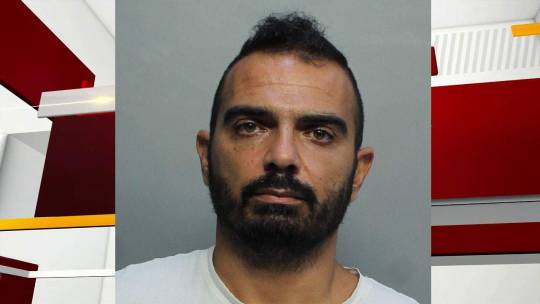
Islamic - Black Lives Matter - Antifa-related Jihad in America
New York: Muslim invaders call for “death to America”, “abolish the U.S. government” and incite violence against NYPD (VIDEOS)

Minnesota: Muslim Charged with Arson of St. Paul High School During BLM Riots

American convert to Islam runs Twitter poll on most ‘satisfying’ way to destroy Lincoln Memorial...using captured, non-Muslim slaves
Illinois: Muslim Democrat nominee who tweeted about watching assault of federal officer on repeat & “laughing every single time” drops out of race

Philadelphia: Black “liberation” groups demand release of Muslim who killed cop
Kentucky: 10 arrested for jewelery store burglary during BLM riots

Maine: Man arrested in drive-by shooting at police headquarters, assaulting a cop and an FBI agent
Michigan: Fugitive with Islamic face tattoo who escaped Virginia jail captured in Battle Creek
Previous monthly reports here.
Immigration Jihad also known as Hijra:
Texas: Illegal immigrants from Iran caught at Texas border; Iranians arrested for fraud & on FBI Most Wanted List
California: Syrian immigrant (refugee?) arrested after importing looted ancient Hercules mosaic
Virginia: Muslim arrested in home invasion robbed family, fled from and smashed cops... with his child in car
Rape Jihad:
Arizona: Muslim arrested for kidnapping, raping and trying to kill a woman in Gilroy
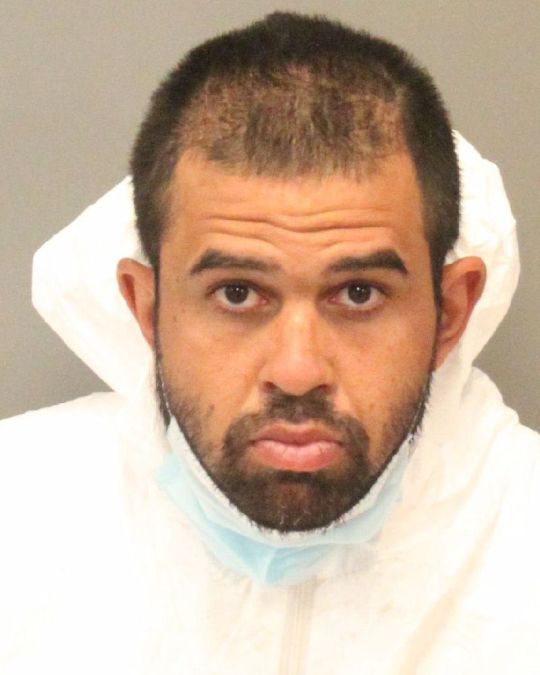
Fraud for Jihad:
Ohio: Muslim sentenced for illegal halal slaughterhouse and discharge of animals into waterways
Virginia: Four Muslims arrested in cigarette trafficking bust in Chesterfield

Terrorist Financing Targeting Center Sanctions Network of ISIS-Linked Financial Facilitators and Money Services Businesses
Mosque Jihad:
Illinois: Bolingbrook imam forced to resign over sexist, racist (n-word) social media posts

Turkey converting buildings to mosques across the U.S.
Government collusion with and failure to prevent jihad:
California: Muslim convicted in Mumbai Massacre granted early release due to coronavirus is rearrested, faces extradition to India
NYC: Conspirator in 1993 jihad plot to bomb NYC landmarks released to Manhattan homeless shelter
New York: Pakistani Muslim lawyer who fire-bombed NYPD vehicle is released on bail, again
California: Sentencing for man who plotted with, purchased guns for San Bernardino jihadis delayed to late October
Maryland: Obama judge delays trial, extends hospitalization for Muslim immigrant arrested prior to ISIS truck jihad attack at National Harbor
Joe Biden’s Jihad:
Biden Hires Islamic Supremacist as Islamic Influence Operations Target His Campaign
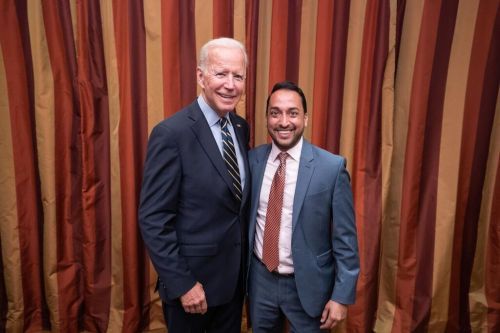
Joe Biden to speak to the nation’s largest Muslim [Brotherhood] American PAC
Muslim Brotherhood group gets Joe Biden to quote hadith calling for jihad against unbelievers (e.g., America)
VIDEO: Joe Biden Calls for Jihad against America Democrat
VIDEO: Joe Biden wishes “we taught more in our schools about the Islamic faith”
VIDEO: Joe Biden will end travel restrictions from Islamic terror hotspots (so-called ‘Muslim ban’) “on Day One”
Bonus: Stories of Muslim diversity we did not have time to post:
Virginia: Honor Killing? Ball Salim Ahmed Ball charged with murder of Reston woman in her home
Virginia: High School - Mohamed Aly - Student Charged for Double Homicide of Northwest Graduates
Virginia: Animal cruelty charges dropped, assault case against Mohamed Fahmy-Arape moves forward
Mohammed Nasim arrested after fatally striking woman then fleeing scene in Brooklyn
Colorado: Greeley police arrest Abdirahman Hussein Mohamed in aggravated robbery at Target
Victories? Or losses due to unregulated immigration (i.e., the Jihad Tax)?
Wyoming: Bill to ban female genital mutilation (FGM) passes despite pushback by radical trans activists
Massachusetts House passes bill to establish criminal and civil penalties for female genital mutilation (FGM)
Previous monthly reports here.
Please share this and other posts on your social media sites.
8 notes
·
View notes
Text
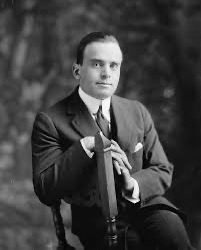
Douglas Elton Fairbanks born Douglas Elton Thomas Ullman; May 23, 1883 – December 12, 1939) was an American actor, screenwriter, director, and producer. He was best known for his swashbuckling roles in silent films including The Thief of Bagdad, Robin Hood, and The Mark of Zorro, but spent the early part of his career making comedies.
Fairbanks was a founding member of United Artists. He was also a founding member of The Motion Picture Academy and hosted the 1st Academy Awards in 1929. With his marriage to actress and film producer Mary Pickford in 1920, the couple became 'Hollywood royalty', and Fairbanks was referred to as "The King of Hollywood", a nickname later passed on to actor Clark Gable.
Though widely considered as one of the biggest stars in Hollywood during the 1910s and 1920s, Fairbanks' career rapidly declined with the advent of the "talkies". His final film was The Private Life of Don Juan (1934).
Fairbanks was born Douglas Elton Thomas Ullman (spelled "Ulman" by Douglas Fairbanks Jr. in his memoirs) in Denver, Colorado, the son of Hezekiah Charles Ullman (September 15, 1833 – February 23, 1915) and Ella Adelaide (née Marsh; 1847–1915). He had two half-brothers, John Fairbanks, Jr. (born 1873) and Norris Wilcox (February 20, 1876 – October 21, 1946), and a full brother, Robert Payne Ullman (March 13, 1882 – February 22, 1948). His father was born in Berrysburg, Pennsylvania, and raised in Williamsport. He was the fourth child in a Jewish family consisting of six sons and four daughters. Charles' parents, Lazarus Ullman and Lydia Abrahams, had immigrated to the U.S. in 1830 from Baden, Germany.
When he was 17, Charles started a small publishing business in Philadelphia. Two years later, he left for New York to study law.
Charles met Ella Adelaide Marsh after she married his friend and client John Fairbanks, a wealthy New Orleans sugar mill and plantation owner. The couple had a son, John, and shortly thereafter John Senior died of tuberculosis. Ella, born into a wealthy southern Roman Catholic family, was overprotected and knew little of her husband's business. Consequently, she was swindled out of her fortune by her husband's partners. Even the efforts of Charles Ullman, acting on her behalf, failed to regain any of the family fortune for her.
Distraught and lonely, she met and married a courtly Georgian, Edward Wilcox, who turned out to be an alcoholic. After they had another son, Norris, she divorced Wilcox, with Charles acting as her own lawyer in the suit. She soon became romantically involved with Charles, and agreed to move to Denver with him to pursue mining investments. They arrived in Denver in 1881 with her son John. (Norris was left in Georgia with relatives and was never sent for by his mother.) They were married; in 1882 they had a son, Robert, and then a second son, Douglas, a year later. Charles purchased several mining interests in the Rocky Mountains, and re-established his law practice. After hearing of his wife's philandering, he abandoned the family when Douglas was five years old. Douglas and his older brother Robert were brought up by their mother, who gave them the family name Fairbanks, after her first husband.
Douglas Fairbanks began acting at an early age, in amateur theatre on the Denver stage, performing in summer stock at the Elitch Gardens Theatre, and other productions sponsored by Margaret Fealy, who ran an acting school for young people in Denver. He attended Denver East High School, and was expelled for cutting the wires on the school piano.
He left school in the spring of 1899, at the age of 15. He variously claimed to have attended Colorado School of Mines and Harvard University, but neither claim is true. He went with the acting troupe of Frederick Warde, beginning a cross country tour in September 1899. He toured with Warde for two seasons, functioning in dual roles, both as actor and as the assistant stage manager in his second year with the group.
After two years he moved to New York, where he found his first Broadway role in Her Lord and Master, which premiered in February 1902. He worked in a hardware store and as a clerk in a Wall Street office between acting jobs.[6] His Broadway appearances included the popular A Gentleman from Mississippi in 1908–09. On July 11, 1907, Fairbanks married Anna Beth Sully, the daughter of wealthy industrialist Daniel J. Sully, in Watch Hill, Rhode Island. They had one son, Douglas Fairbanks Jr., also a noted actor. The family moved to Los Angeles in 1915.
After moving to Los Angeles, Fairbanks signed a contract with Triangle Pictures in 1915 and began working under the supervision of D. W. Griffith. His first film was titled The Lamb, in which he debuted the athletic abilities that would gain him wide attention among theatre audiences. His athleticism was not appreciated by Griffith, however, and he was brought to the attention of Anita Loos and John Emerson, who wrote and directed many of his early romantic comedies.
In 1916, Fairbanks established his own company, the Douglas Fairbanks Film Corporation, and would soon get a job at Paramount.
Fairbanks met actress Mary Pickford at a party in 1916, and the couple soon began an affair. In 1917, they joined Fairbanks' friend Charlie Chaplin selling war bonds by train across the United States and delivering pro-war speechs as Four Minute Men. Pickford and Chaplin were the two highest paid film stars in Hollywood at that time. To curtail these stars' astronomical salaries, the large studios attempted to monopolize distributors and exhibitors. By 1918, Fairbanks was Hollywood's most popular actor, and within three years of his arrival, Fairbanks' popularity and business acumen raised him to the third-highest paid.
In 1917, Fairbanks capitalized on his rising popularity by publishing a self-help book, Laugh and Live which extolled the power of positive thinking and self-confidence in raising one's health, business and social prospects.
To avoid being controlled by the studios and to protect their independence, Fairbanks, Pickford, Chaplin, and D. W. Griffith formed United Artists in 1919, which created their own distributorships and gave them complete artistic control over their films and the profits generated.
Sully was granted a divorce from Fairbanks in late 1918, the judgment being finalized early the following year. After the divorce, the actor was determined to have Pickford become his wife, but she was still married to actor Owen Moore. Fairbanks finally gave her an ultimatum. She then obtained a rapid divorce in the small Nevada town of Minden on March 2, 1920. Fairbanks leased the Beverly Hills mansion Grayhall and was rumored to have used it during his courtship of Pickford. The couple married on March 28, 1920. Pickford's divorce from Moore was contested by Nevada legislators, however, and the dispute was not settled until 1922. Even though the lawmakers objected to the marriage, the public widely supported the idea of "Everybody's Hero" marrying "America's Sweetheart". That enthusiasm, in fact, extended far beyond the borders of the United States. Later, while honeymooning in Europe, Fairbanks and Pickford were warmly greeted by large crowds in London and Paris. Both internationally and at home, the celebrated couple were regarded as "Hollywood Royalty" and became famous for entertaining at "Pickfair", their Beverly Hills estate.
By 1920, Fairbanks had completed twenty-nine films (twenty-eight features and one two-reel short), which showcased his ebullient screen persona and athletic ability. By 1920, he had the inspiration of staging a new type of adventure-costume picture, a genre that was then out of favor with the public; Fairbanks had been a comic in his previous films. In The Mark of Zorro, Fairbanks combined his appealing screen persona with the new adventurous costume element. It was a smash success, and parlayed the actor into the rank of superstar. For the remainder of his career in silent films he continued to produce and star in ever more elaborate, impressive costume films, such as The Three Musketeers (1921), Douglas Fairbanks in Robin Hood (1922), The Thief of Bagdad (1924), The Black Pirate (1926), and The Gaucho (1927). Fairbanks spared no expense and effort in these films, which established the standard for all future swashbuckling films.
In 1921, he, Pickford, Chaplin, and others, helped to organize the Motion Picture Fund to assist those in the industry who could not work, or were unable to meet their bills.
During the first ceremony of its type, on April 30, 1927, Fairbanks and Pickford placed their hand and foot prints in wet cement at the newly opened Grauman's Chinese Theatre in Hollywood. (In the classic comedy Blazing Saddles, Harvey Korman's villain character sees Fairbanks' prints at Grauman's and exclaims, "How did he do such fantastic stunts...with such little feet?")
Fairbanks was elected first President of the Motion Picture Academy of Arts and Sciences that same year, and he presented the first Academy Awards at the Roosevelt Hotel. Today, Fairbanks also has a star on the Hollywood Walk of Fame at 7020 Hollywood Boulevard.
While Fairbanks had flourished in the silent genre, the restrictions of early sound films dulled his enthusiasm for film-making. His athletic abilities and general health also began to decline at this time, in part due to his years of chain-smoking. On March 29, 1928, at Pickford's bungalow, United Artists brought together Pickford, Fairbanks, Charlie Chaplin, Norma Talmadge, Gloria Swanson, John Barrymore, D.W. Griffith and Dolores del Río to speak on the radio show The Dodge Brothers Hour to prove Fairbanks could meet the challenge of talking movies.
Fairbanks' last silent film was the lavish The Iron Mask (1929), a sequel to the 1921 release The Three Musketeers. The Iron Mask included an introductory prologue spoken by Fairbanks. He and Pickford chose to make their first talkie as a joint venture, playing Petruchio and Kate in Shakespeare's The Taming of the Shrew (1929). This film, and his subsequent sound films, were poorly received by Depression-era audiences. The last film in which he acted was the British production The Private Life of Don Juan (1934), after which he retired from acting.[citation needed]
Fairbanks and Pickford separated in 1933, after he began an affair with Sylvia, Lady Ashley. Pickford had also been seen in the company of a high-profile industrialist. They divorced in 1936, with Pickford keeping the Pickfair estate.[13] Fairbanks and Ashley were married in Paris in March 1936.
He continued to be marginally involved in the film industry and United Artists, but his later years lacked the intense focus of his film years. His health continued to decline. During his final years he lived at 705 Ocean Front (now Pacific Coast Highway) in Santa Monica, California, although much of his time was spent traveling abroad with his third wife, Lady Ashley.
On December 12, 1939, Fairbanks suffered a heart attack. He died later that day at his home in Santa Monica at the age of 56. His last words were reportedly, "I've never felt better." His funeral service was held at the Wee Kirk o' the Heather Church in Glendale's Forest Lawn Memorial Park Cemetery where he was placed in a crypt in the Great Mausoleum.
Two years following his death, he was removed from Forest Lawn by his widow, Sylvia, who commissioned an elaborate marble monument for him featuring a long rectangular reflecting pool, raised tomb, and classic Greek architecture in Hollywood Forever Cemetery in Los Angeles. The monument was dedicated in a ceremony held in October 1941, with Fairbanks's close friend Charlie Chaplin reading a remembrance. The remains of his son, Douglas Fairbanks Jr., were also interred there upon his death in May 2000.
In 1992 Douglas Fairbanks was portrayed by actor Kevin Kline in the film Chaplin.
In 1998, a group of Fairbanks fans started the Douglas Fairbanks Museum in Austin, Texas. The museum building was temporarily closed for mold remediation and repairs in February 2010.
In 2002, AMPAS opened the "Fairbanks Center for Motion Picture Study" located at 333 S. La Cienega Boulevard in Beverly Hills. The building houses the Margaret Herrick Library.
On November 6, 2008, the Academy of Motion Picture Arts and Sciences celebrated the publication of their "Academy Imprints" book Douglas Fairbanks, authored by film historian Jeffrey Vance, with the screening of a new restoration print of The Gaucho with Vance introducing the film.
The following year, opening on January 24, 2009, AMPAS mounted a major Douglas Fairbanks exhibition at its Fourth Floor Gallery, titled "Douglas Fairbanks: The First King of Hollywood". The exhibit featured costumes, props, pictures, and documents from his career and personal life. In addition to the exhibit, AMPAS screened The Thief of Bagdad and The Iron Mask in March 2009. Concurrently with the Academy's efforts, the Museum of Modern of Art held their first Fairbanks film retrospective in over six decades, titled "Laugh and Live: The Films of Douglas Fairbanks" which ran from December 17, 2008, to January 12, 2009. Jeffrey Vance opened the retrospective with a lecture and screening of the restoration print of The Gaucho.
Recently, due to his involvement with the USC Fencing Club, a bronze statue of Fairbanks was erected in the Academy of Motion Picture Arts & Sciences Courtyard of the new School of Cinematic Arts building on the University of Southern California campus. Fairbanks was a key figure in the film school's founding in 1929, and in its curriculum development.[24][citation needed]
The 2011 film The Artist was loosely based on Fairbanks, with the film's lead portraying Zorro in a silent movie featuring a scene from the Fairbanks version.[citation needed] While thanking the audience in 2012 for a Golden Globe award as Best Actor for his performance in the film, actor Jean Dujardin added, "As Douglas Fairbanks would say," then moved his lips silently as a comedic homage. When Dujardin accepted the 2011 Academy Award for Best Actor in a Leading Role, Fairbanks was cited at length as the main inspiration for Dujardin's performance in The Artist.
An important accolade given to the Douglas Fairbanks legacy was a special screening of his masterpiece, The Thief of Bagdad, at the 2012 edition of the Turner Classic Movies Film Festival. On April 15, 2012, the festival concluded with a sold-out screening of the Fairbanks film held at the historic Egyptian Theatre in Hollywood. The evening was introduced by TCM host Ben Mankiewicz and Fairbanks biographer Jeffrey Vance.
The nickname for the sports teams of the University of California-Santa Barbara is The Gauchos in honor of Fairbanks' acting in the eponymous film.
#douglas fairbanks#silent era#silent hollywood#silent movie stars#golden age of hollywood#classic movie stars#classic hollywood#1910s movies#1920s hollywood#1930s hollywood#movie legends
4 notes
·
View notes
Text
Fatherhood in Sunny
My favorite thing is daddy issues, so of course I gravitate to a show that has so many. So many. It’s always daddy issues in Philadelphia. Uh, I have a lot of thoughts, so I’m just going to jump right in.
Frank Reynolds: World’s Best Dad* *as long as he didn’t raise you
Frank is undoubtedly just the worst person and that bleeds into his role as father. He was largely absent while Dennis and Dee were growing up, the only support he provided was financial. Emotional support was completely non-existent. This leaves us with highly privileged, emotionally stunted people. (Barbara did have a hand in this with harsh criticism of Dee and high praise for Dennis, so yay for toxic parents all around)
Frank poisons and pimps his children as a way to gain more power and money. Dennis falls into the trap more often than Dee does, or at least in a more compliant way. Dee resents people telling her what to do, while Dennis crumbles when people fall into a caretaker role for him. We see this in The Gang Gets Whacked when Dennis just completely loses all sense of independence with Frank as his pimp. We get a glimpse of this in Mac and Dennis Break Up, where Dennis is barely able to function without Mac telling him what to do or doing simple tasks for him.
Dee has verged in the opposite direction. While she still craves the same validation that Dennis does, if she doesn’t get it when she asks for it she decides to try and prove her worth by showing how much she can do on her own. She takes over whatever scheme on her own, or makes a show of how helpful and stable she is. (she isn’t) Dee tries to convince herself that she’s grown up without trauma, Dennis lets the trauma consume him.
The fact that Frank is not their biological father doesn’t end up affecting the dynamic so much. The damage is already done, so when the twins try to connect with their bio dad, they’re unable to form a genuine emotional connection. (as an aside i love the choice of actor being the dad from 7th Heaven) They are fundamentally broken people, largely due to Frank’s influence, so they resort to scamming and scheming. Bruce highlights all the attributes that Frank is lacking: charity and empathy. He tries with the twins but ultimately knows that relationship won’t work out and chooses to distance himself from them. Frank, sticks around, joining in on the shenanigans, but never giving them the love and care they so desperately crave and deserved growing up.
But things with Charlie and Mac are different. The way Frank treats Charlie is much kinder than he treats the rest of the world. It’s unclear if Frank is Charlie’s bio dad, but that hardly matters. Their relationship really blurs the line between familial/romantic/platonic. It’s strange and beautiful and disgusting. Get you a man who will play nightcrawlers with you. Still they get along well and Frank does a lot to take care of Charlie, both financially and emotionally. (in that weird codependent unhealthy way of theirs.)
Charlie grew up without a dad and his mom being was a sex worker (no shame in that, but maybe don’t bring a bunch of strange men around your kid). Speaking of, it’s pretty fucked up that the only consistent adult male figure Charlie had growing up was an uncle who molested him. There’s also a lot to unpack with the fact that uncle Jack is a lawyer, which is a career that Charlie latched onto. (You are not a certified bird lawyer but I support you) When all is said and done, Frank is the best father figure Charlie has.
And in a weird way, he’s also the best father figure Mac has. But I can’t really go into that without talking about Luther
Luther McDonald: A Dad, I Guess* *I hope he gets shanked in prison
Mac grew up neglected on all sides of the table. He was poor, his dad was in and out of prison, and he needed to deal drugs just to be somewhat accepted by his peers. Luther does not love his son. Whenever they do interact, Luther is critical, manipulative, and witholds affection. Again we can bring up the way Mac and Dennis interact with each other. Dennis, in general, is more affectionate with Mac, at least in earlier seasons. They’re on more equal footing and Mac often manipulates Dennis right back. I promise this isn’t an entire post about how Mac and Dennis project their daddy issues on each other, but they sure do that don’t they?
Luther simply doesn’t care about Mac and shows open contempt for him. Mac has been vying for this man’s approval since he was a child. It’s important for Mac to come out to his dad. Regardless of how Mac feels about the outcome, Luther walking out provides some closure. If there isn’t any acceptance in that moment then there never will be.
That brings us back to Frank. Throughout Mac Finds His Pride, he keeps saying that he doesn’t it and never will. But the thing is, he tries. He makes the effort to try and help Mac find his place as a gay man, because even if he doesn’t get it, he supports him. As weird as that is coming from Frank. And in the end he does understand Mac better. So not to praise Frank too highly as a father because he is a disgusting little man who abuses and neglects his own children, but he did kind of adopt Charlie and Mac in his own way.
But we have another father to talk about, too.
Dennis Reynolds: Father of the Year* *I guess. Who knows what happened in North Dakota? Not us. Maybe Mandy and Brian Jr. died
So, obviously, Dennis isn’t someone you’d think of as father material. It would cramp his image as cool bachelor. But the fact is, he totally bailed on the chance to hook up with some mom at the waterpark to spend his whole day with a cool kid. And he was ready to lay into who he thought was her parent. He saw a smart kid, and made a weird connection to her. And even when she swindled him, he was so proud of her. Sure, teaching your kid tips on how to swindle people isn’t good parenting, but it was a bonding experience. His day with Abby was probably the most genuine connection he made to anyone outside of the gang. Sometimes you adopt a daughter for a day.
There was no pressure or expectation with Abby, though. That could be brushed off as just Dennis being weird. Dennis definitely has an idea in his head about what he is supposed to be and what he needs to do to fill those roles. He doesn’t have a strong sense of identity and will latch onto certain expectations. When Mandy shows up with a baby she named after him (or, rather, fake him) it brings to light all the things that society expects. You grow up, you get married, you have children. It’s normal. It’s grounded in something. It’s what is expected of the straight male experience. (when Dennis says things like “As a straight man” i can feel my soul leave my body with shock every time)
The immediate response from the gang is to get him out of this situation. Because one of the roles Dennis has so carefully crafted for himself is the cool, straight bachelor who can’t be tied down by any woman. Throughout the whole thing, we see his resolve crumble. Frank was a piece of shit father, and Dennis has seen how Mac and Charlie turned out without dads. He’s thinking about the consequences of not filling this specific role. (Mandy is amazing af though and would definitely raise a stable child without Dennis’s help)
The crushing weight of your own trauma can make you do some crazy things. Like make you leave your entire life behind to go be a dad in North Dakota because you think that is the correct thing to do. We don’t know what happened there, but the fact that he came back indicates that it didn’t pan out. Maybe Dennis isn’t cut out to be a dad when faced by the expectations of the nuclear family. The fact is, he could be a wildly interesting father who encourages his kids, or maybe he’d just end up feeling trapped and having a breakdown. There’s a lot of fatherhood trauma in there
A Conclusion of Sorts
With all of the gang dealing with their relationship to fatherhood, it is interesting that Dennis, Mac, and Charlie were all fully willing to take up the mantle of father for the baby Dee gave birth to. I don’t for one minute think they would have raised a “normal” child, and it’s likely they would have fallen into the same patterns they saw growing up, but to embrace the idea and be excited about it is certainly something. Mac was ready to raise an entire child with Dennis (That was probably more to do with Dennis than it was about being a dad). Time and time again we see the gang confronted with fatherhood and either embracing it or rejecting it. Dads really fuck you up!
#iasip meta#iasip#sometimes you write 1500 words of commentary for a sitcom#also i know i talk about mac a lot but he's my fave so i'm not ashamed of my clear bias#also i think sometimes the read more is broken on mobile#so i apologize for that
34 notes
·
View notes
Photo

Arrivals & Departures 11 January 1755 or 1757 – 12 July 1804 Celebrate Alexander Hamilton Day!
Alexander Hamilton (11 January 1755 or 1757 – 12 July 1804) was an American statesman, politician, legal scholar, military commander, lawyer, banker, and economist. He was one of the Founding Fathers of the United States. He was an influential interpreter and promoter of the U.S. Constitution, as well as the founder of the nation's financial system, the Federalist Party, the United States Coast Guard, and the New York Post newspaper. As the first Secretary of the Treasury, Hamilton was the main author of the economic policies of George Washington's administration. He took the lead in the Federal government's funding of the states' debts, as well as establishing a national bank, a system of tariffs, and friendly trade relations with Britain. His vision included a strong central government led by a vigorous executive branch, a strong commercial economy, a national bank and support for manufacturing, and a strong military. Thomas Jefferson was his leading opponent, arguing for agrarianism and smaller government.
Hamilton was born out of wedlock in Charlestown, Nevis. He was orphaned as a child and taken in by a prosperous merchant. When he reached his teens, he was sent to New York to pursue his education. He took an early role in the militia as the American Revolutionary War began. In 1777, he became a senior aide to General Washington in running the new Continental Army. After the war, he was elected as a representative from New York to the Congress of the Confederation. He resigned to practice law and founded the Bank of New York.
Hamilton was a leader in seeking to replace the weak national government under the Articles of Confederation; he led the Annapolis Convention of 1786, which spurred Congress to call a Constitutional Convention in Philadelphia. He helped ratify the Constitution by writing 51 of the 85 installments of The Federalist Papers, which are still used as one of the most important references for Constitutional interpretation.
Hamilton led the Treasury Department as a trusted member of President Washington's first Cabinet. Hamilton successfully argued that the implied powers of the Constitution provided the legal authority to fund the national debt, to assume states' debts, and to create the government-backed Bank of the United States. These programs were funded primarily by a tariff on imports, and later by a controversial whiskey tax. He mobilized a nationwide network of friends of the government, especially bankers and businessmen, which became the Federalist Party. A major issue in the emergence of the American two-party system was the Jay Treaty, largely designed by Hamilton in 1794. It established friendly trade relations with Britain, to the chagrin of France and supporters of the French Revolution. Hamilton played a central role in the Federalist party, which dominated national and state politics until it lost the election of 1800 to Jefferson's Democratic-Republican Party.
In 1795, he returned to the practice of law in New York. He called for mobilization against the French First Republic in 1798–99 under President John Adams, and became Commanding General of the previously disbanded U.S. Army, which he reconstituted, modernized, and readied for war. The army did not see combat in the Quasi-War, and Hamilton was outraged by Adams' diplomatic success in resolving the crisis with France. His opposition to Adams' re-election helped cause the Federalist party defeat in 1800. Jefferson and Aaron Burr tied for the presidency in the electoral college in 1801, and Hamilton helped to defeat Burr, whom he found unprincipled, and to elect Jefferson despite philosophical differences.
Hamilton continued his legal and business activities in New York City, and was active in ending the legality of the international slave trade. Vice President Burr ran for governor of New York State in 1804, and Hamilton campaigned against him as unworthy. Taking offense, Burr challenged him to a duel on July 11, 1804, in which Burr shot and mortally wounded Hamilton, who died the following day.
4 notes
·
View notes
Text
Welcome back, everyone! First let’s go back to the ancient times of last week with a few to lead off the insanity that comes from our Lefty pals:
04/28 – Democrats Say Trump Not Allowed To Discuss Ralph Northam’s Infanticide Advocacy
Following the Bro-Fo Omar model, the newest form of hate speech from Conservatives is to accurately quote Leftists
04/29 – Authorities To Arrest Canadian Father If He Refers To Trans Child As Her Real Sex
Not that they give a damn, but if there are any sane members left of the gay community, taking a stand against something as wrong as this would do a lot more to showing us normals that not all Leftists are hateful and intolerant
05/02 – Obama saw the 2016 loss of Hillary Clinton as a ‘personal insult’
To paraphrase an old joke that I remember hearing about frat boys:
“How many Barack Obamas does it take to change a light bulb?”
“One. He just holds it up and the world revolves around him.”
05/03 – INSANE VIDEO shows KIDS in Philadelphia Muslim center chanting about DECAPITATING their enemies!!
Add this to the list of things that are shocking now but will probably be part of the platform for the Democratic party’s presidential nominee in 12 years
05/04 – Pelosi Wants Progressives To Rein In Their Message. She’s Afraid Trump Will Make This Move If They Don’t.
As much as I dislike Pelosi, I wish our side were as brilliant at tactics as she is. That said, I love how she’s now basically powerless to stop the “Bats*** Crazy Caucus” that’s taking over her party.
05/05 – The Einstein working for the Senate Democrats
I love stories like these – poll gets launched. Rude surprise follows.
05/06 – WATCH: PA State Rep. Brian Sims Relentlessly Harasses An Elderly Pro-Life Lady On The Sidewalk
Isn’t the honesty refreshing now that Democrats no longer feel the need to hide how much they hate half of this country? And he also wants to dox some teenagers.
05/07 – Crushed by the Leftist Juggernaut: One Lawyer’s Story
A scary and sobering look at how one half of the country feels it is OK to treat the other. And I would add that as it continues to get worse, the Vichy Conservatives still seem to think that it’s ungentlemanly to fight back.
05/08 – The Democrats’ Sore Loser Syndrome
I’d take The American Spectator’s R. Emmett Tyrell’s assertion that Democrats haven’t lost a presidential election since 1956 – when is the last time the Dems’ ran a presidential nominee who didn’t hate America? I’d argue that it was Gore, as he didn’t seem to hate us until after we rejected him.
05/09 – Progressives Face a Bleak Post-Mueller Landscape
To steal that great phrase I recall Rush using years ago as a take on FDR’s most famous line, “The Democrats’ new slogan should be, The only thing we have to offer is… fear itself!”
05/10 – Chris Buskirk: Yes, David and Nancy French, A Christian Can Support Trump
Stories like this make me want to go bak in time to cancel my subscription to National Review a few years ago, as opposed to last month.
From the archives, remember Occupy Wall Street? While folks from our side got annoyed at having these thugs and vandals compared to the Tea Party, I pointed that It turns out that the OWS Protesters Are Just Like the Tea Partiers After All!
One last note regarding this week’s Twitter roundup – while I generally keep them on the humorous/mocking side, the first one is pretty heavy and has a thread below it well worth reading. Keep it handy for any of your Lefty friends who’ve never read a history book and need to be educated at to what Nazis actually were.
On that cheery note, have a great weekend, everybody!
16 notes
·
View notes
Photo

T H E F I R S T L A D I E S #2 // Abigail Adams
Born in 1744 to a minister and his wife, Abigail Smith was a sickly child and was never formally educated, but she had an open, eager mind and access to several family libraries. Through her mother, she belonged to the prominent political Quincy family. She met a young lawyer named John Adams when she was fifteen. Despite mutual initial disinterest--and though Abigail's mother felt that John was not good enough for her--the couple fell hard for one another and were married four years later. Abigail went on to have five children with John between 1765 and 1772, four of whom lived to adulthood. During that time, John grew more and more involved in the burgeoning cause of American independence and when the Revolution broke out, Abigail became solely responsible not only for managing a farm in the middle of a war zone, but also for raising four young children. She maintained a frequent and faithful correspondence with her husband throughout his absence. Abigail often acted as John’s adviser, famously reminding him to "remember the ladies" in the new government. Such was her influence that some historians consider Abigail a founder of the United States in her own right.
Following the war, Abigail sailed to Paris to join John, there on a diplomatic assignment, in 1784. She struggled to run a grand house full of servants but developed an interest in the opera while in Paris and also befriended John's colleague Thomas Jefferson. Upon returning to Massachusetts four years later, Abigail promptly set about renovating the new house she and John had purchased. She then moved to Philadelphia in 1797 when her husband was elected president. Unlike her predecessor, she became so deeply involved in politics that Adams opponents sometimes referred to her as "Mrs. President." Abigail was, as always, John's informal--but well-informed--adviser as well as his fiercest and most loyal supporter. He wrote at one point that he could “do nothing without” her. Even after his term ended, she continued to follow her son John Quincy's political career closely.
Abigail retired to Quincy to live quietly with her beloved John at last. There she raised several of her grandchildren and resumed her correspondence with Jefferson, though she had felt betrayed by his victory over John in the Election of 1800. She died in 1818, just days after her fifty-fourth wedding anniversary and only weeks shy of her seventy-fourth birthday. In the two centuries since her death, Abigail Adams has remained one of the most renowned American First Ladies. She is remembered in particular for her staunch support of women’s rights; she also vocally opposed slavery throughout her life.
#abigail adams#john adams#american history#women in history#historyedit#*firstlady#if you've been following me for any time at all you know how much I love her#SO MUCH#I love that she was called Mrs. President like it was supposed to be deragatory?#I bet Abigail was like DAMN STRAIGHT (and John too)#neither John nor Abigail would be who or what they were or have done what they did without each other#a marriage of true minds ♥#the Great American Love Story if you ask me
517 notes
·
View notes